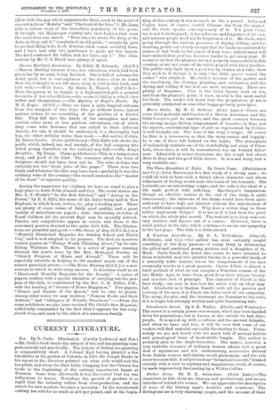CURRENT LITERATURE.
Tea. By D. Crole. Illustrated. (Crosby Lockwood and Son.) —Mr. Crole's book treats the subject of tea and tea-planting com- prehensively and practically. The history of Indian tea-planting is comparatively short. A Colonel Kyd having planted a few tea-shrubs in his garden at Calcutta in 1780, Sir Joseph Banks in his report to the directors pointed out what soils would suit the tea-plant, and when the East India Company lost the Chinese tea trade at the beginning of the century experiments began at Kumaon. Some time afterwards it was discovered that tea was indigenous to Assam. Nowadays the growth of gardens is so rapid that the industry suffers from over-production, and the search for new markets becomes a necessity. In the seventeenth century tea sold for as much as £10 per pound, and at the begin- ning of this century it was as much as IN. a pound. India and Ceylon have, of course, ousted Chinese tea from the market, and Mr. Crole speaks contemptuously of it. Yet good China tea is not to be despised; it has a flavour and fragrance of its own, and nervous people need not be frightened of it. Mr. Crole, when going through the various processes of drying, rolling, and fer- menting, points out clearly enough that the haste necessitated by rushes of leaf leads to the export of fiery teas ; indeed many will have noticed that good tea becomes harder to get every year. It seems to us that the planters are not properly represented in this country, or are not aware of the tricks played with their produce. The public only light upon a good tea by chance, as a rule; then they stick to it though it is only "the little grocer round the corner" who retails it. Mr. Crole's account of the garden and the machinery, the clearing, planting, and cultivation, and the drying and rolling of the leaf, are most interesting. There are plenty of diagrams. This is the third known book on tea, and from the planter's point of view, should be the most useful for them. The reader will learn that the preparation of tea is generally conducted on somewhat happy-go-lucky principles.






















































 Previous page
Previous page